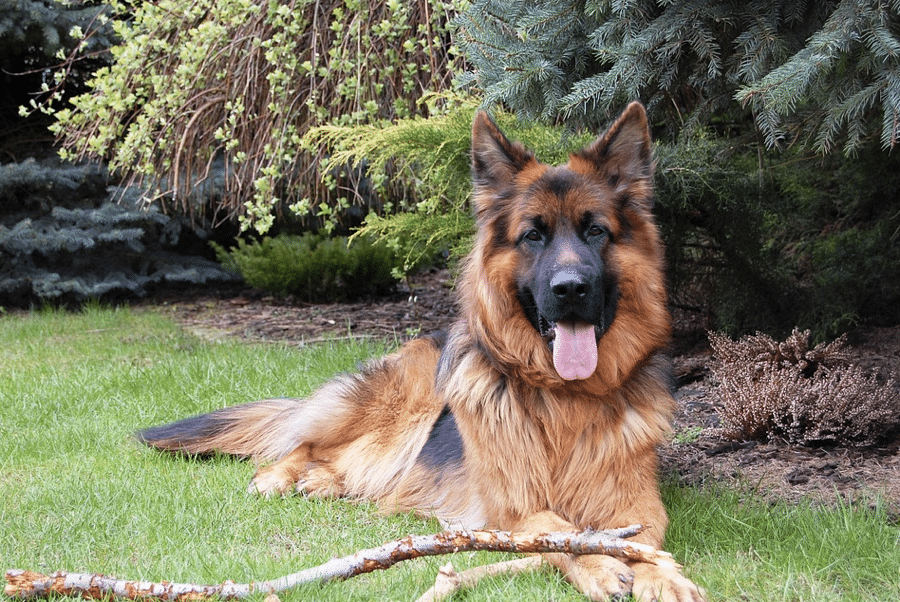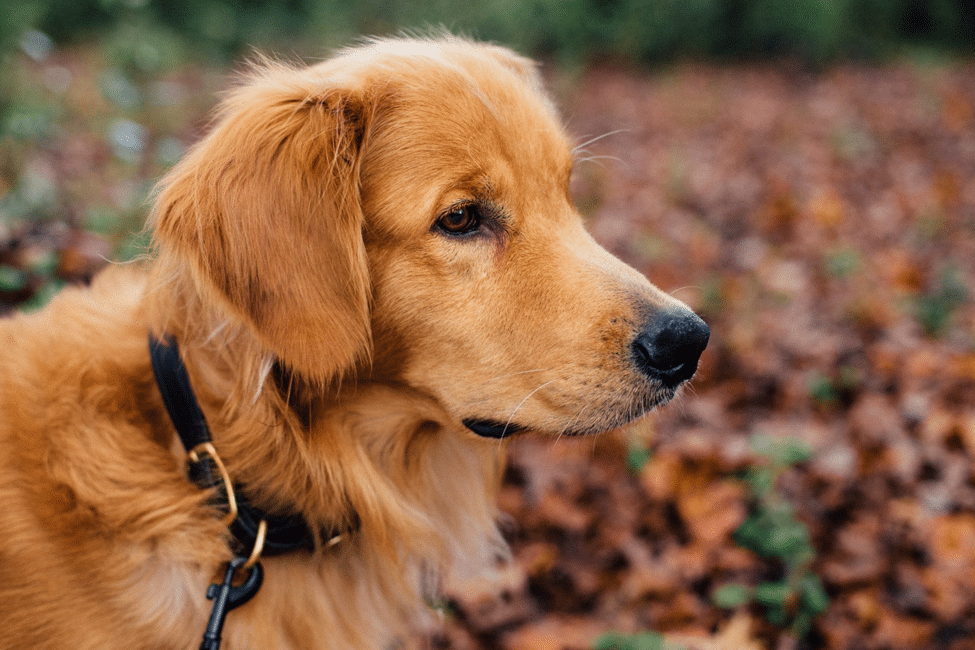
· By Mitch Felderhoff
Top Health and Personality Traits of 6 Popular Large Dog Breeds
Welcome to part one of our summer series that investigates the defining characteristics of certain special dog breeds. Here you’ll find health and wellness info on everything from personality traits and health complications to dietary needs and grooming practices.
Whether you’re thinking of adopting a large breed of dog, or simply want to brush up about one that’s already part of your family, read on.
Here’s what pet experts say about keeping these six popular dog breeds healthy and happy.
1. Golden Retriever

Temperament traits:
These super friendly, highly intellectual breeds are lovers who like to work and help. Though they originally hail from Scotland, they’re as American as apple pie and a staple among many households with children or people with disabilities. Their playful attitude and joyful nature are contagious. No wonder they make such wonderful, trusted family dogs and service animals.
Grooming practices:
Known and named for their silky yellowy fur, Golden Retrievers have a thick coat that should be brushed regularly. (Lest it begins to collect sticks or stickers from their outdoor adventures.)
Dietary needs:
Goldies tend to experience obesity, especially as they age. Feed a high-quality grain-free diet that can keep the weight off instead of a weight loss food.
Health concerns:
Their hearts and eyes are particularly vulnerable. Be sure to take your Golden Retriever for regular cardiac examinations and ophthalmologist evaluations.
Suggested Activities:
Their eager-to-please good nature makes them easy to train and easier to love. Take them running and hiking, out in the fields, or on your next hunting trip and they’ll be happy as a clam in high tide.
2. Great Dane

Temperament traits:
Great Danes are dogs you can depend on. They have a relaxed attitude and an unmistakable elegance. Their patience level for children is high, but their tolerance of burglars or anyone who would harm their household is low. These gentle giants also love to please, so treat them right and they’ll show you the same.
Grooming practices:
Though their hair is short and fine, because of the surface area of their body, even the relatively little shedding they do can feel like a lot. Intermittently pet them with a rubber grooming mitt for easy cleanup.
Dietary needs:
Because of their large size, and propensity to bloat, it can be a good idea to feed your Dane a high-quality dog food multiple times throughout the day.
Health concerns:
Their thyroids can be over or under active and should be tested at regular intervals. Tumors and hip dysplasia are also common because of their large size.
Suggested Activities:
Low impact activities like walks are great sources of exercise. Though they seem chill, don’t skip on activity time. When in doubt, throw the ball in a safe area and they’ll be your best friend.
3. Boxer

Temperament traits:
These active babies are always alert with a bit of a silly side to boot. Their upbeat personalities give off a fun-loving air that’s hard to resist. Their curious faces are telling of their inquisitive nature. Exposure and socialization in early age will help solidify them as the protective, courageous family dogs they were born to be.
Grooming practices:
Their coat is short, silky, and requires generally little maintenance. You don’t even need a brush with bristles to keep it looking perfect. A simple grooming glove or rubber tooth tool will do just fine.
Dietary needs:
Since they’re known for their shiny coats, you might try an all natural or grain-free dog food in the case to prevent hair loss or skin irritations from food allergies.
Health concerns:
They’re sensitive to heat and cold extremes so best to keep them indoors as much as possible during summer and winter seasons. They should also have regular cancer screenings, AS\SAS cardio tests to prevent aortic valve disease, and at least one degenerative myelopathy DNA test.
Suggested Activities:
They’re high on the energy level and can be easily bored if under-stimulated. Make sure to change up tricks, commands, and exercise activities to keep things fresh. They also need to stay on leash, as they’re prone to chase.
4. German Shepherd

Temperament traits:
German Shepherds are a confident breed that learns quickly and possesses a distinct lack of fear. They’re a favorite among police forces who depend on the agility and command-oriented nature of these hard-working, devoted dogs.
Grooming practices:
Their medium-length fur is double layered, moving from course outer strands to a soft undercoat. Brush about once a week to keep up with the hair and more frequently in times of warmer weather when they tend to shed heavily. Bathe only occasionally and keep nails trimmed monthly.
Dietary needs:
This active breed does best with a protein-packed diet to help power their athletic prowess. High-quality dog food with meat as the #1 ingredient recommended. Extra protein sources like eggs may also be added to the mix.
Health concerns:
Swollen abdomens as a result of bloat can quickly become life-threatening. Be on the lookout and contact your vet immediately if you suspect something is wrong. Because of their high activity level, joint issues, especially those of the hips, knees, and elbows, can be common.
Suggested Activities:
Agility training, herding play, tracking games and being with their family are among their favorites.
5. Collie

Temperament traits:
Thanks to mid-century television programming Collies have been rightfully typecast as pillars of committed poise. Though Lassie is indeed an exceptional canine, the breed definitely lives up to its reputation. Their remarkable character and commitment to their companions, including children, are nothing short of exceptional.
Grooming practices:
Aside from their proud character, a Collie’s coat is their most notable feature. Some breeds, like smooth Collies, don’t matt easily. Others, known as rough Collies, are especially prone to developing painful matting around their ears and elbows. Get a brush with bristles that extend down to the skin and step up the routine after a female’s heat cycle when she’s most likely to shed. Males usually start anew each year around their birth month.
Dietary needs:
Like the Golden Retriever, a grain free doggie diet will help Collie coats retain their charismatic shimmer. The higher their food is in Omega 3 fatty acids, the more lustrous their fur will remain.
Health concerns:
Collie’s are known for having a degenerative eye disease so it’s important to have their peepers checked as a precaution. Some also experience drug and medication sensitivity so ask your vet about possible DNA tests to help you identify a potential complication in advance.
Suggested Activities:
These dogs are natural herders and life-long learners. They can master just about anything with positive reinforcement. The more they’re able to run and play in new settings, the happier they’ll be. And if not, you’re bound to hear about it. (Literally, they’re barkers.)
6. Dalmatian

Temperament traits:
Few breeds are as distinct as a Dalmatian. Their social and distinguished demeanor has made them a favorite among noblemen for centuries. They were originally reared to safeguard larger cargo like horse-drawn carriages. Today they remain dedicated watchdogs.
Grooming practices:
No matter how much they shed, the spots will remain. That’s the good news. The bad news is that while the fur itself doesn’t require much upkeep, your house may require some cleanup. Be sure to take a Q-tip to the inside of the ears to prevent build-up that can lead to infection.
Dietary needs:
Finding a high-quality kibble that has the perfect balance of vitamins, minerals, and antioxidants will help keep your Dalmatian’s stamina at full tilt.
Health concerns:
Dals are prone to kidney stones, so make sure your pup stays super hydrated and gets a prescription dog food when you suspect a stone. Years of breeding has accidentally resulted in deafness over time, so if you notice anything off, ask your vet to perform a hearing test.
Suggested Activities:
Make sure you’re exercising your Dalmatian mentally and physically. They’re sensitive creatures so it’s important to socialize fear out of them early on, by engaging in new experiences, settings, people, and other dogs whenever possible.
In the end, the more you know about your large dog breed, the better you can care for them. Commit these important health and behavior tidbits to memory to keep your fur friend out of the doghouse – and the vet’s office.
